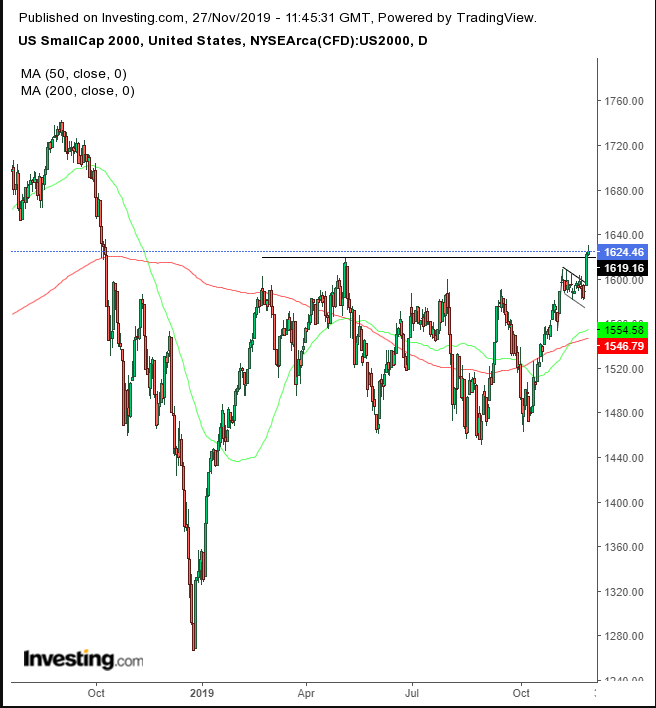Here’s why U.S. small caps are likely to outperform in the coming weeks and months.
Value seekers have been steadily increasing demands for U.S. small caps, taking advantage of lower valuations relative to large caps — which are showing the biggest difference in multiples in about 15 years.
As smaller caps are more speculative, they tend to get sold off first when concerns about economic recession arise. The recent advance in the Russell 2000 suggests these concerns are receding — as the U.S. and China are seen to strive for a trade resolution and the Fed continued to cut rates, along with its promise to go on supporting the economy.
Illustrating the market correlation between small caps and a looming recession, lower interest rates have consistently boosted small caps in the past 60 years. And, during those periods they gained 28% on average in the first year after the Fed started a rate cut cycle, almost double the 15% for large caps.
Perhaps, that is why the Russell 2000 has been outperforming on all major U.S. averages in the past three months, despite lagging on a YTD basis.
The Russell has advanced 6.6% so far in November, followed by the Nasdaq Composite's 4.3% rise and the Dow Jones Industrial Average increase of just under 4%. The S&P 500 index is trailing at just +3.45%, almost half the gain of the Russell.
However, when comparing YTD performance, the Russell 2000 still falls short, posting the smallest gains among the major American indices. It has climbed 20.45%, lagging behind the Dow’s 20.55%, the S&P's 25.35% and the 30.33% of the tech heavy Nasdaq.
In other words, the Russell 2000 is still undervalued relative to larger caps. Technicals, too, suggest a further rise.

The small cap index provided an upside breakout to a congestion with a downward bias since Nov. 5. The range is a falling, bullish flag. The downward tilt is important. It suggests that investors who have been carrying the load have had the opportunity to unload. The congestion — a tight trading range, with just a slight tilt rather than a drop — demonstrates that there has been demand absorbing the supply.
This is significant. It means there are new investors to take up the weight.
The upside breakout demonstrates that all supply has been absorbed, and bulls are prepared to pay higher prices. Since whoever wished to sell presumably did so during this period, the market is expected to be on the side of demand for the next leg. The expectation is that it will repeat the previous sharp uptake, 3.6%, top to bottom, in the four days — Oct. 31 through Nov. 5 — before the market took a breather.
The signals, however, are not coming from just a single technical phenomenon; there are other indications that provide corroborating evidence.
The 50 DMA crossed above the 200 DMA, triggering a so-called golden cross. It’s a potent one, considering that both MAs are pointing up, and demonstrates that the 50 DMA gained on a rising 200 DMA. This is much more meaningful than when it gains over a lagging 200 DMA.
The upside breakout also broke through a resistance since May 6. The gauge has not been able to climb above the 1620 level since it collapsed from its record highs in August 2018, establishing an uptrend since the December bottom. It is the only major U.S. benchmark not to have broken new record highs since. If investors continue to favor small caps, it may very well make new highs soon.
Trading Strategies
Conservative traders might prefer to wait for that new record, to sync the short-term uptrend with the long-term one.
Moderate traders may be content with a 2% penetration above the May 3 high to rely on the breakout.
Aggressive traders might want to wait for a pullback, so as not to get whipsawed out of their position.
Trade Sample:
